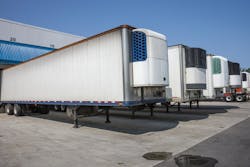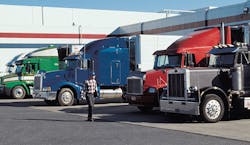The Global Cold Chain Alliance, better known as GCCA, is a critical part of the food supply chain, representing 3PL temperature-controlled and cold storage warehousing, construction and building, and transportation.
With more than 1,100 member companies in 85 countries, GCCA works to ensure that food and other perishables are safe and high quality. In the United States and Canada alone, approximately 260 billion pounds of perishable food moves through GCCA member facilities every year. GCCA members serve the food industry by providing third-party, temperature-controlled supply chain services (3PL services) to food companies.
As many food companies choose to invest their capital resources in core business assets and competencies, rather than spending in the capital-intensive, temperature-controlled logistics industry, GCCA members provide the vital link in the cold chain—keeping food safely stored, safely packaged, and safely shipped.
And in no time in history has the supply chain, or the cold chain, been hotter than it is now.
The pandemic thrust the industry into the spotlight, and the world has been watching. The supply chain has demonstrated great strength and resiliency in responding to disruptions over the last 18 months. The greater supply chain has worked together in unprecedented ways to deliver consumer goods as quickly and safely as possible.
As people have learned throughout the pandemic, it’s hard to predict what challenges are around the corner. Through port congestion, manufacturing disruptions, labor issues, and many other obstacles, GCCA worked tirelessly with the White House, members of Congress, and industry partners to help improve the situation and keep the supply chain strong. The organization’s pandemic work also complements its efforts in many other areas, most notably transportation.
Carrier supports
As previously noted, one arm of GCCA covers transportation. The sole mission of GCCA transportation is to help support the needs and interests of the refrigerated transportation industry by ensuring perishable goods are transported safely.Additionally, GCCA transportation helps member companies comply with federal regulations and create programs that make this compliance more streamlined.
One example of this is the fact that the sanitary transportation of food has become a focal point for policy makers and the food industry. The Food Safety Modernization Act (FSMA), administered by the U.S. Food and Drug Administration (FDA), includes a rule titled “Sanitary Transportation of Human and Animal Food” (STF). The goal of the STF is to prevent transportation practices that create food safety risks, such as failure to properly refrigerate food, inadequate cleaning of vehicles between loads, and failure to properly protect food. The STF rule became effective on June 6, 2016, establishing requirements for shippers, loaders, rail or motor carriers, and receivers involved in transporting human and animal food.
The STF regulation touches all aspects of the cold chain and represents an important opportunity for third-party logistics companies to work with their partners across the supply chain to ensure food safety and quality. The rule emphasizes the role of industry best practices in achieving regulatory compliance.
In response to the STF rule, GCCA developed a Refrigerated Transportation Best Practices Guide. The best practices guide is available for free to the food industry.
In addition to the Best Practices Guide, GCCA has developed a training program for drivers to become compliant with the STF rule. This training program meets regulatory requirements for driver training and can also be found on the GCCA website.
Food transportation
As the food industry moved to adopt best practices for the sanitary transportation of food, GCCA recognized the need for a certification program to identify those companies that have successfully implemented practices to achieve sanitary transportation of food. Ensuring that food is safely delivered to customers is something to be acknowledged and celebrated.
GCCA launched the Certified Cold Carrier Program in 2019 to recognize asset-based carrier organizations for their commitment to sanitary and safe transportation of perishable products. The certification program provides independent, third-party assurance that asset-based carrier companies are aligned with industry-prescribed best practices for the safe and sanitary transport of food. The certification is based on the Best Practices Guide and helps participants:
- Instill confidence with customers—certification by an industry-based third party conveys impartial judgment based on a transparent standard
- Demonstrate commitment to sanitary transport of food
- Differentiate companies from their competitors
- Show dedication to furthering the transportation and supply chain industries
GCCA has been recognized for its efforts by FDA and others as a leader on the issue of sanitary transportation of food. In July 2020, GCCA was asked by FDA to participate in a session entitled “Safe Transportation of Human and Animal Food: Best Practices” during the Institute of Food Technologists (IFT) SHIFT20 annual conference.
Moving forward
GCCA will continue to develop and promote resources in support of the sanitary transportation of food. GCCA encourages cold chain companies and their partners across the food supply chain to work together, utilizing industry best practices, to ensure the safety and quality of perishable products.
If the world has learned anything from the COVID-19 pandemic, it’s the importance of the supply chain in everyday life, and GCCA is actively working to increase the visibility of supply-chain issues. Association leaders have been meeting with high-level government officials in the Biden administration and Congress to highlight challenges and opportunities facing the food supply chain, and that work will continue, as elevating supply-chain policymaking remains a major priority. The pandemic already put a spotlight on the supply chain, and GCCA intends to keep it there to ensure new policies continue to move the industry in the right direction.
Meghan Rodgers is the vice president of public relations and industry affairs for the Global Cold Chain Alliance.
About the Author
Meghan Rodgers
Meghan Rodgers is the vice president of public relations and industry affairs for the Global Cold Chain Alliance.

